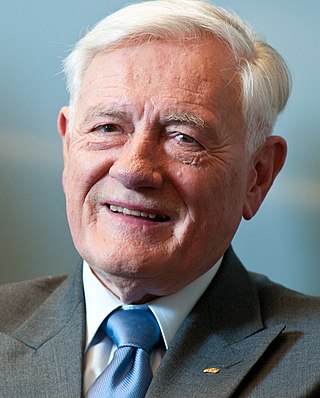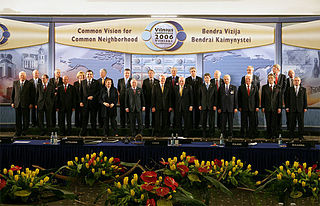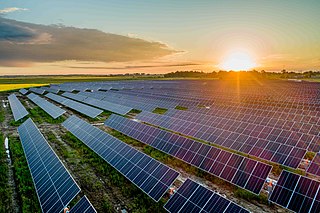
Politics of Lithuania takes place in a framework of a unitary semi-presidential representative democratic republic, whereby the president of Lithuania is the head of state and the prime minister of Lithuania is the head of government, and of a multi-party system.

Vytautas Landsbergis is a Lithuanian politician and former Member of the European Parliament. He was the first Speaker of Reconstituent Seimas of Lithuania after its independence declaration from the Soviet Union. He has written 20 books on a variety of topics, including a biography of Mikalojus Konstantinas Čiurlionis, as well as works on politics and music. He is a founding signatory of the Prague Declaration, and a member of the international advisory council of the Victims of Communism Memorial Foundation.

Valdas Adamkus is a Lithuanian politician, diplomat and civil engineer who served as the fifth and seventh president of Lithuania from 1998 to 2003 and again from 2004 to 2009.

Visaginas is a city in northeastern Lithuania. It is the centre of Lithuania's youngest municipality, located on the north-eastern edge of the country. It was built as a town for workers engaged in the construction of the now decommissioned Ignalina Nuclear Power Plant. Visaginas is the only city in Lithuania where the majority of population speaks Russian as their first language. Originally the aerial view of Visaginas was designed to resemble a butterfly. However, after work on the nuclear power plant was cancelled, so was further construction of the town. Currently Visaginas consists of three residential regions that locals refer to as the 1st, 2nd and 3rd Microdistricts. Visaginas has 14 streets. The city grew up in a pine forest by Lake Visaginas. Tourism is currently an area of great potential, as is the possibility of a new nuclear power plant.

The Ignalina Nuclear Power Plant is a decommissioned two-unit RBMK-1500 nuclear power station in Visaginas Municipality, Lithuania. It was named after the nearby city of Ignalina. Due to the plant's similarities to the infamous Chernobyl Nuclear Power Plant in both reactor design and lack of a robust containment building, Lithuania agreed to close the plant as part of its agreement of accession to the European Union. Unit 1 was closed in December 2004; Unit 2 in December 2009, the plant accounted for 25% of Lithuania's electricity generating capacity and supplied about 70% of Lithuania's electrical demand, was closed on December 31, 2009. Proposals have been made to construct a new nuclear power plant at the site, but such plans have yet to come to fruition.

Elections in Lithuania are held to select members of the parliament, the president, members of the municipal councils and mayors, as well as delegates to the European Parliament. Lithuanian citizens can also vote in mandatory or consultative referendums.

The Lungmen Nuclear Power Plant, formerly known as Gongliao and commonly as the Fourth Nuclear Power Plant, is an unfinished nuclear power plant in New Taipei City, Taiwan. It consists of two ABWRs each of 1,300 MWe net. It is owned by Taiwan Power Company (Taipower).

Vilnius Conference 2006: Common Vision for Common Neighborhood brought together delegations from the Baltic and Black Sea regions to discuss common interests and reinforce their commitments to the advancement of democracy and common values in their respective regions. The Conference took place in Vilnius, the capital of Lithuania, and was hosted by the President of Lithuania, Valdas Adamkus.

Eesti Energia AS is a public limited energy company in Estonia with its headquarters in Tallinn. It is the world's biggest oil shale to energy company. The company was founded in 1939. As of 2014, it operates in Estonia, Latvia, Lithuania, Finland, Jordan and Utah, United States. In Estonia, the company operates under the name Eesti Energia, while using the brand name Enefit for international operations. The main raw material for energy production – oil shale – is extracted from mines located in Eastern-Estonia and owned by the company. The group of Eesti Energia has three main operation areas: electricity generation, shale oil production, and sale and distribution of electricity. Its shares are owned by the Government of Estonia.
Nuclear power in Italy is a controversial topic. Italy started to produce nuclear energy in the early 1960s, but all plants were closed by 1990 following the 1987 referendum. As of 2023, Italy is one of only three countries, along with Lithuania and Germany, that completely phased out nuclear power for electricity generation after having operational reactors.

Parliamentary elections were held in Lithuania on 12 October 2008, with a second round on 26 October in the constituencies where no candidate won a majority in the first round of voting. All 141 seats in the Seimas were up for election; 71 in single-seat constituencies elected by majority vote and the remaining 70 in a nationwide constituency based on proportional representation. Together with the elections, a referendum on extending the operation of Ignalina Nuclear Power Plant was held.
LEO LT AB or Lithuanian Electricity Organization was a national energy holding company in Lithuania. The company owned shares of Lithuania's three major electric power production and distribution companies. It was established in early 2008 to raise funds for the construction of the planned Visaginas Nuclear Power Plant after close down of Ignalina Plant, and Lithuania–Sweden and Lithuania–Poland power connections. The decision to liquidate the company, mired in controversies and attacked by critics, was reached by the shareholder of LEO LT on 4 September 2009.

Visaginas Nuclear Power Plant was a planned nuclear power plant project in Lithuania. It was proposed to be built at the site of the closed Ignalina Nuclear Power Plant, which was shut down on 31 December 2009 in accordance with Lithuania's accession agreement to the European Union. The two reactors of the Ignalina plant are currently undergoing a decommissioning process.

Presidential elections were held in Lithuania on 22 December 2002 and 5 January 2003. Incumbent President Valdas Adamkus ran for reelection alongside sixteen other candidates, the largest field of presidential candidates in the country's history. Though Adamkus held a large lead over his closest opponent, Rolandas Paksas of the Liberal Democratic Party (LDP), in the first round of the election, Paksas defeated Adamkus in the second round with 54.71% of the vote.

A referendum on extending the operation of the Ignalina Nuclear Power Plant was held in Lithuania on 12 October 2008 alongside parliamentary elections. The country's government was obliged to close down Ignalina as part of its treaty of accession to the European Union.
Lithuania does not have any operational nuclear power reactor. It operated two RBMK reactors at Ignalina Nuclear Power Plant which were shut down in 2004 and 2009.

Poland currently operates a single research reactor, Maria. It has no operational nuclear reactors for power production, but is to start construction of a plant with three Westinghouse AP1000 reactors in 2026 to be completed in 2033-2036, and is also intending to build small modular reactors.

Parliamentary elections were held in Lithuania on 14 October 2012, with a second round on 28 October in the constituencies where no candidate won a majority in the first round of voting. All 141 seats in the Seimas were up for election; 71 in single-seat constituencies elected by majority vote and the remaining 70 in a nationwide constituency based on proportional representation. Together with the elections, a referendum on the construction of a new nuclear power plant was held.

Lithuania is a net energy importer. In 2019 Lithuania used around 11.4 TWh of electricity after producing just 3.6 TWh.

The Lithuanian Green Party is a green-liberal political party in Lithuania. It was founded in 2011. The party's chairwoman is environmental activist Ieva Budraitė. From 2012 to 2022, it was represented by a single member in the Seimas, until its final representative, Algirdas Butkevičius, left the party.













